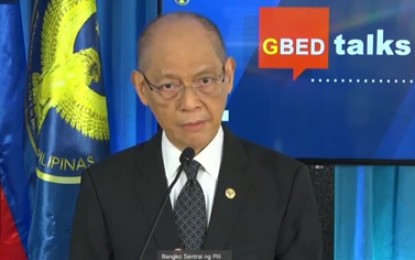
APPROPRIATE SOLUTION. Bangko Sentral ng Pilipinas (BSP) Governor Benjamin Diokno reiterates that non-monetary policy measures are still the appropriate solution to address the impact of the higher inflation partly due to the ongoing Russia-Ukraine conflict. He said the central bank continues to have policy tools to lessen the impact of the war on the domestic inflation rate. (Photo screengrab from BSP briefing)
MANILA – Bangko Sentral ng Pilipinas (BSP) Governor Benjamin Diokno maintains that non-monetary policy measures remain the appropriate solution to address the impact of the ongoing Russia-Ukraine conflict on the domestic economy.
In a virtual briefing on Wednesday, Diokno said the primary impact of the conflict on the Philippine economy is through higher prices of commodities like oil and food, which affects inflation and in turn, lower the value of income and lessens demand.
He said the war between the two countries intensified the upticks in commodity prices in the global market as it added to supply-side disruptions.
Diokno said both countries account for around 29 percent of global wheat exports and 19 percent of world corn supplies.
He added the inflationary impact of the conflict was felt in the domestic economy since last March when energy-related inflation drove the rate of price increases.
The inflation rate last April accelerated to 4.9 percent, exceeding the government’s target band of 2-4 percent until 2023, from the previous month’s 4 percent.
The average inflation in the first four months this year stood at 3.7 percent, but monetary authorities forecast the full-year average at around 4.3 percent.
“In sum, inflation risks are tilted to the upside this year, but broadly balanced in 2023. Upside risks over the near term continue to emanate from the shortage in the domestic food supply as well as from the potential impact of higher oil prices on transport fares,” he said.
Diokno cited that in the past, supply-side shocks like hikes in the prices of oil and other commodities in the international market “have been best addressed through timely non-monetary policy interventions that could ease domestic supply constraints and prevent second-round effects on prices.”
The government has disbursed fuel subsidies to drivers of public utility vehicles (PUVs) as well as farmers and fisherfolk to cushion the impact of the oil price increase on these vulnerable sectors.
The Regional Tripartite Wages and Productivity Board recently announced the increase in the minimum wage in the National Capital Region (NCR) and Western Visayas.
Also, petitions for minimum fares have been filed, and these are among the second-round effects of higher inflation.
Diokno said the announced wage hikes are within their baseline forecasts and are “consistent with the growth of the country’s labor productivity as well as historical minimum wage adjustments.”
He said, “higher-than-expected wage adjustments due to the uptick in oil prices would lead to further second-round effects on inflation.”
“That said, the BSP continues to wield a wide array of policy instruments to respond to possible adverse impacts of this external shock. The BSP likewise supports the timely implementation of selected direct non-monetary measures by the government to mitigate the impact of higher oil prices,” he added. (PNA)
